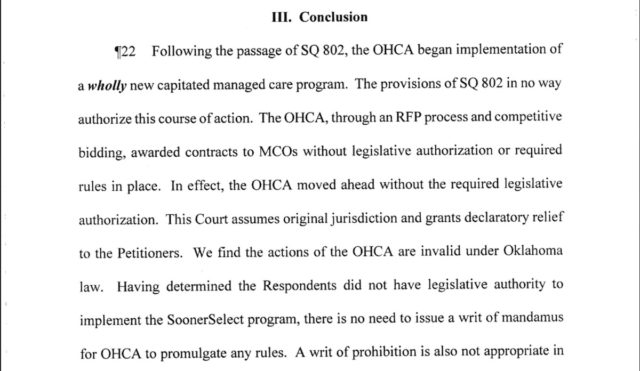
In a 6-3 decision Tuesday, the Oklahoma Supreme Court invalidated Gov. Kevin Stitt’s plan to move part of the state’s Medicaid program to a managed care model administered through private companies because justices said it did not receive required legislative approval.
“From a review of the (Oklahoma Health Care Authority) Act and the (Oklahoma Medicaid Options Act), we find no express or implied legislative authority for the OHCA to implement a wholly new managed care program such as SoonerSelect,” Justice Douglas Combs wrote in the majority opinion (embedded below).
Stitt criticized the decision in a statement Wednesday.
“The Supreme Court’s ruling will unnecessarily delay Oklahoma’s efforts to improve health outcomes through managed care, which the Legislature confirmed is the right path forward for our state through Senate Bill 131,” Stitt said. “I will continue to work with the Oklahoma Health Care Authority to determine the next steps in the process.”
Stitt allowed SB 131 to become law without his signature, stating “concerns” that the effort to place “guardrails” on third-party managed care “will likely increase costs and limit our ability to improve health outcomes compared to the original plan I proposed.”
Mary Clarke, president of the Oklahoma State Medical Association, which was one of the plaintiffs in the suit, praised the decision in a press release.
“We are pleased with the Supreme Court’s ruling, and we recognize the heart of this issue is much larger than managed care,” Clarke said. “It’s about ensuring that state agencies follow the law when spending Oklahoma’s tax dollars. Today’s ruling represents an important victory for transparency in government and Oklahoma taxpayers.”
Rep. Marcus McEntire (R-Duncan) has opposed Stitt’s privatized managed care plan and said Wednesday that much work lies ahead.
“I am pleased with the Court’s correct decision, especially considering the politics around privatized managed Medicaid this session,” he said. “However, this disagreement is far from a resolution. It is time to bring in all the stakeholders to negotiate a deal in good faith that insures our Medicaid members receive quality care and our health providers are supported.”
‘Specifically authorized by law’
The lawsuit was brought against the state, the OHCA and OHCA CEO Kevin Corbett by a number of medical groups, including the Oklahoma State Medical Association, the Oklahoma Dental Association, the Oklahoma Osteopathic Association, the Oklahoma Society of Anesthesiologists and the Oklahoma chapter of the American Academy of Pediatrics.
Corbert released a statement Wednesday saying he is “disappointed.”
“Improving health outcomes in Oklahoma will continue to be a top priority for the Oklahoma Health Care Authority,” Corbett said. “While we are disappointed in the Supreme Court ruling, we respect their decision and continue to focus on providing quality care to the more than one million Oklahomans we serve through SoonerCare. We are excited to welcome our newest population of Oklahomans now eligible for benefits through Medicaid expansion. This will allow us to serve an estimated 200,000 more people who deserve health care benefits.”
The respondents in the lawsuit argued that the OHCA had been granted broad authority to implement managed care and enter into related contracts by the 1993 law that set the stage for the state’s previous incarnation of third-party managed care, which was rolled back in the early 2000s after provider numbers dropped and Medicaid patients had less access to care, particularly in rural areas.
The court found, however, that that law only applied to arrangements that had been “specifically authorized by law” and that setting up a brand-new managed care program was not covered by previous authorization.
Three of the court’s judges — Vice Chief Justice M. John Kane, Justice Dustin Rowe, and Justice James Winchester — dissented from the decision, citing SB 131, known as the Ensuring Access to Medicaid Act, which became law last month because many legislators wanted to place “guardrails” and conditions on third-party managed care.
The bill, Winchester wrote, “resolves the legal question for the Oklahoma Health Care Authority to move forward.”
One basis for the court’s decision was the precedent set in Treat v. Stitt, a case decided earlier this year regarding the governor’s ability to enter into gaming compacts with Oklahoma tribes without legislative approval. The court decided against the governor, finding that the governor’s unilateral action “exceeded his authority” and “disrupted the balance between the executive and legislative branches.”
Tuesday’s decision also ruled that the numerous contracts the state entered into with managed care companies are invalid because the OHCA failed to properly promulgate rules for the bidding process.
A defeat for the Stitt administration
The plan to move Medicaid services to managed care followed the approval of State Question 802, which opened Medicaid to thousands of previously ineligible Oklahomans.
The state currently administers Medicaid directly through the Health Care Authority, but Stitt and others — including Senate Floor Leader Kim David (R-Porter) argued that contracting with private companies would save money and improve the state’s notably poor health outcomes.
“It’s a disappointing day for the hard-working Oklahomans who were needing a better solution. The Supreme Court decision will lead to the largest expansion of government Oklahoma has seen in many years,” David said Wednesday. “We had a solution, just like they do in over 40 other states — a solution where private industry would manage the care of the Medicaid population. The additional $250 million price tag of growing government will come at a cost to Oklahoma’s infrastructure and education system.”
But opponents argued the exact opposite, and the plan received criticism from state medical groups and other lawmakers.
“I think managed care, at best, is a moderately successful health care system. At worst, it is a complete trainwreck for some states,” said Sen. Greg McCortney (R-Ada). “I think we can do better. I think we can lead the nation, and I think we have the opportunity to do that now that the Supreme Court has ruled the way they did.
McCortney said he hopes all state leaders can have “a robust conversation” about Oklahoma’s Medicaid system.
I think we have an opportunity to sit down with a completely clean state and dream about what really is the best way for Oklahoma to take care of its people.”
The Oklahoma Health Care Authority Board approved $2.1 billion to be spent on managed care contracts in January, and contracts were subsequently awarded to a number of companies. The court’s decision invalidates those contracts.
Read the Supreme Court’s decision on managed care
(Update: This article was updated at 1:45 p.m. Wednesday, June 2, to include a quote from Kevin Corbett.)





















